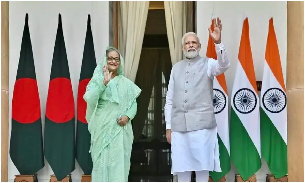Bangladesh foreign affairs adviser Md Touhid Hossain said Bangladesh’s relationship with India was expected to remain stable under the new interim government in Dhaka – if former Prime Minister Sheikh Hasina extended her stay in India. His comments come as some relief to the embattled Awami League leader and will be reassuring for India.
It was first reported that Hasina had fled to India for temporary asylum. But Hossain was quick to remark that the tale of Bangladesh–India relationships is just a small narrative of a much bigger and more important issue based on mutual interest. He opined that Bangladesh will always endeavour to keep friendly relations with India and briefed foreign diplomats in Dhaka on the current situation and the initiatives that are being taken to reestablish order.
Hossain brushed off apprehensions that Bangladesh could take umbrage at the long stay of Hasina in India terming the question as only hypothetical and said there is no reason to be apprehensive about it. ‘Why should relations with a particular country be affected by someone’s stay there?’ he asked.
The events that led to Hasina’s ouster are being viewed as a major setback for India which had built up sound diplomatic and trade relations with Dhaka under her leadership. In recent years, India has invested heavily in its relationship with Hasina.
Hasina’s Impact On Indo-Bangladesh Relations
Hasina had been an important ally for India, helping to assist in mitigating at least partially the security, logistical, and political issues that were thrown up by the 1947 partition of India and Pakistan.
After partition, East Pakistan lay in the eastern part of India, which later became Bangladesh in 1971 after the consolidation of a bloody war of independence, which was fought by Hasina’s father, Sheikh Mujibur Rahman.
In the birth of Bangladesh, with Indian support, a new set of problems arose as the country swung between the identity of a secular democracy and the edginess of a stance akin to Pakistan as an Islamic republic.
Sheikh Hasina’s Power Play with India
Although Hasina was in the strong support with China, she never forgot to put India’s interest in the front. A recent example of this was when she chose India over China for the $1 billion river development project .
The relations between India and Bangladesh were sealed once more when Hasina’s government inked a major deal with the Indian Adani Group in the power sector.
The deal was to source coal-based power from a $1.7 billion plant to be set up in Jharkhand, India. But the deal raised eyebrows in the opposition camp as Bangladesh would be paying higher tariffs for this power compared to other available sources.



